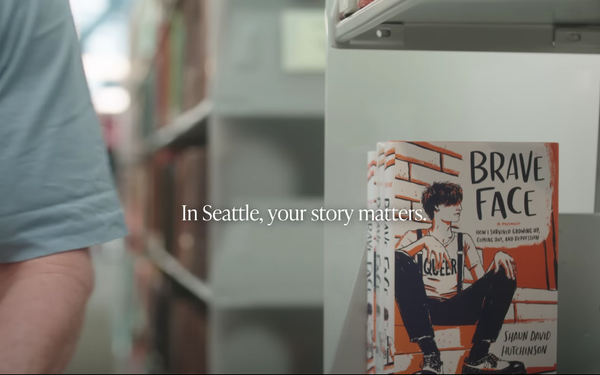
Book bans may seem an unusual topic for a tourism campaign, but
then Seattle isn’t a typical city.
A continuation of the “#Bookmarked” campaign launched by Visit Seattle and agency partner PB& last year to celebrate the city’s
rich literary history, the campaign tackles the issue by celebrating local authors whose works have been targeted for censorship, and highlighting the city’s effort to promote freedom of
expression.
“Seattle’s literary roots go deep. This is a city where many authors come to write,” PB& founder Brit Fero told Marketing Daily, citing the creative
writing workshops of the Hugo House organization, the city’s world-class library, and its status as one of just two U.S. cities designated as a Unesco City of Literature.
Unfolding
across three “episodes” leading up to Banned Book Week (Sept. 22-28), the campaign shares excerpts of banned books by local authors Jewell Parker Rhodes (“Ghost Boys”), Shawn David Hutchinson (“Brave Face”), and
Jonathan Eviason (“Lawn Boy”) read by notable Seattle residents: writer/LGBTQ+ activist Dan Savage, actor Jeremy Rudd, and artist/activist Angelina Villalobos.
advertisement
advertisement
Visit Seattle worked
with agency partner PB& on the campaign, as well as partnering with Atlantic: Rethink for production. Campaign videos will run across media channels owned by The Atlantic, as well as on
YouTube and Visit Seattle’s social channels. On Sept. 29, Visit Seattle will also conduct a session as part of a festival hosted by TheAtlantic addressing freedom of
expression.
The issue is a pressing one. According to the American Library Association (ALA) Office for Intellectual Freedom, there were 4,240 unique book titles challenged in 2023, a 65%
increase from the previous year’s total.
ALA president Emily Drabinski noted in a statement that, as in preceding years, book bans and challenges primarily targeted books focused on
LGBTQ+ individuals and people of color. Of the ALA’s list of the 10 most challenged books in 2023, eight included LGBTQ+ content among the reasons for the challenges.
Appropriately, such
stories are central to Visit Seattle’s campaign as well, and each spot ends with the message, “In Seattle, your story matters,” which serves the additional function of promoting the
city’s inclusive culture. “Seattle has always been a welcoming, accepting, progressive city. And yet some of our authors are found on several of those banned books list,” Fero said.
“We saw that as an opportunity to…celebrate the values of this city as an accepting and inclusive place. Both travel and literature expand our minds.”
The campaign’s
intended audience is a group PB& describes as “Advenculturists,” 200% more likely to be members of book clubs and 40% more likely to read books at least twice a week.
“That group of travelers is primarily 25-54,” Fero explained, “highly educated and affluent,” are more likely to travel, and tend to tie travel into their many other
interests.
As with the preceding “#Bookmarked” effort, the campaign is part of a wider effort to broaden perceptions of Seattle beyond coffee, rain, and the space needle.
Fero said the campaign’s success was being monitored through content consumption metrics –with a particular emphasis on watch time – as well as general favorability and
perspective shift, whether it’s reaching the intended audience, and if it succeeds in driving interest to visit Seattle.